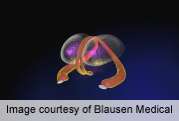Patients with Cushing's syndrome have abnormal brain metabolites suggestive of neuronal dysfunction even after they appeared to have been cured, according to a study presented at the annual European Congress of Endocrinology, held from April 27 to May 1 in Copenhagen.
(HealthDay)—Patients with Cushing's syndrome have abnormal brain metabolites suggestive of neuronal dysfunction even after they appeared to have been cured, according to a study presented at the annual European Congress of Endocrinology, held from April 27 to May 1 in Copenhagen.
Using proton magnetic resonance spectroscopy, Eugenia Resmini, M.D., Ph.D., from Hospital Sant Pau in Barcelona, Spain, and colleagues measured metabolites in the hippocampi of 18 adults with Cushing's syndrome who had been biochemically cured and 18 age- and education-matched healthy adults.
The researchers found that the two groups had similar left and right total hippocampal volumes. Patients with Cushing's syndrome had significantly lower NAcetyl-aspartate in the left and right hippocampus as well as significantly lower NAcetyl-aspartate plus N-Acetyl-aspartyl-glutamate in the right hippocampus. In addition, patients with Cushing's syndrome had significantly higher glutamate plus glutamine in both hippocampi. The alterations are suggestive of neuronal dysfunction, according to the authors.
"Persistently abnormal metabolites are evidenced in the hippocampi of Cushing's syndrome patients despite endocrine cure," Resmini and colleagues conclude. "These functional alterations could be early markers of glucocorticoids neurotoxicity and would precede hippocampal volume reduction."
More information:
Abstract
More Information
Health News Copyright © 2013 HealthDay. All rights reserved.



















